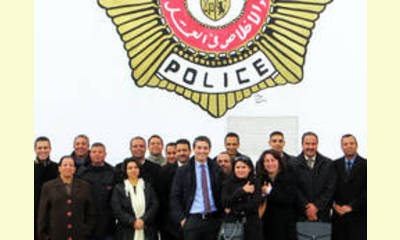|
|
UNESCO partners with Tunisian Ministry of the Interior to improve safety of journalists
an article by UNESCO Media Services
In the context of support for institutional
reforms in Tunisia undertaken by the United
Nations, UNESCO and the Tunisian Ministry of the
Interior began a cooperation programme in January
2013 aimed at training security forces on human
rights, freedom of expression and safety of
journalists.

Participants of the training on freedom of expression and safety of journalists, Tunisia, February 2013 - copyright UNESCO/Daniel Deloit
click on photo to enlarge
The programme, which aims to improve relations
between security forces and journalists, is
particularly important in a time of democratic
transition. It is the first of its kind in the
Arab region. The programme will include a series
of trainings for members of the Ministry of
Interior security forces (Police, National Guard
and Emergency Preparedness services).
The first training was held from 28 January to 13
February at the Ecole de formation des cadres de
la Police de Salambo. This training of trainers
included sessions that brought together members of
the security forces and journalists, helping to
create a space for dialogue between these two
groups so that everyone better understands the
situation and the role and needs of the other in a
democracy. They also enabled the participants to
discuss the challenges of maintaining public order
while respecting human rights.
"This training programme was organized because
there were many clashes between security forces
and journalists, especially during demonstrations,
civil unrest and large trials,” said Mehdi
Benchelah, Head of the UNESCO Project Office in
Tunis. “The police and journalists will continue
to cross each other in the news field. It is
essential to initiate a dialogue if we are to
reduce tensions and strengthen freedom of
expression and the safety of journalists in
Tunisia,"
The National Union of Tunisian Journalists (SNJT),
a project partner, facilitated the participation
of journalists in the training. In total, 20
members of the Police, National Guard and
Emergency Preparedness, and 10 Tunisian
journalists attended the first training. Other
training sessions will be organized in the coming
months in the region.
The programme will additionally include the adoption
by the Ministry of the Interior of a code of conduct
for members of its security forces to improve media
relations and the safety of journalists.
The programme aims to support the reform of security
institutions and democratic transition in Tunisia.
It received the support of the Kingdom of the
Netherlands and the Swedish International
Development Cooperation Agency (Sida).
UNESCO is the United Nations agency with a mandate
to protect freedom of expression and the safety of
journalists.
(Click here for a French version of this article)
|








|
DISCUSSION
Question(s) related to this article:
Free flow of information, How is it important for a culture of peace?
* * * * *
Latest reader comment:
Perhaps the simplest way to illustrate the essential importance of free flow of information for a culture of peace is to discuss the importance of the control of information for the culture of war.
Here are excerpts from an Washington Post investigation two years ago entitled Top Secret America: A hidden world, growing beyond control. To read the original, click here.
"* Some 1,271 government organizations and 1,931 private companies work on programs related to counterterrorism, homeland security and intelligence in about 10,000 locations across the United States.
* An estimated 854,000 people, nearly 1.5 times as many people as live in Washington, D.C., hold top-secret security clearances.
* In Washington and the surrounding area, 33 building complexes for top-secret intelligence work are under construction or have been built since September 2001. Together they occupy the equivalent of almost three Pentagons or 22 U.S. Capitol buildings - about 17 million square feet of space.
* Many security and intelligence agencies do the same work, creating redundancy and waste. For example, 51 federal organizations and military commands, operating in 15 U.S. cities, track the flow of money to and from terrorist networks.
* Analysts who make sense of documents and conversations obtained by foreign and domestic spying share their judgment by publishing 50,000 intelligence reports each year - a volume so large that many are routinely ignored." . . .
"Every day across the United States, 854,000 civil servants, military personnel and private contractors with top-secret security clearances are scanned into offices protected by electromagnetic locks, retinal cameras and fortified walls that eavesdropping equipment cannot penetrate. . .
Much of the information about this mission is classified. That is the reason it is so difficult to gauge the success and identify the problems of Top Secret America, including whether money is being spent wisely. The U.S. intelligence budget is vast, publicly announced last year as $75 billion, 21/2 times the size it was on Sept. 10, 2001. But the figure doesn't include many military activities or domestic counterterrorism programs."
As we said in the draft Declaration and Programme of Action on a Culture of Peace that we sent from UNESCO to the UN General Assembly in 1998:
"98. It is vital to promote transparency in governance and economic decision-making and to look into the proliferation of secrecy justified in terms of 'national security', 'financial security', and 'economic competitiveness'. The question is to what extent this secrecy is compatible with the access to information necessary for democratic practice and social justice and whether, in some cases, instead of contributing to long-term security, it may conceal information about processes (ecological, financial, military, etc.) which are a potential threat to everyone and which need therefore to be addressed collectively."

|
|









